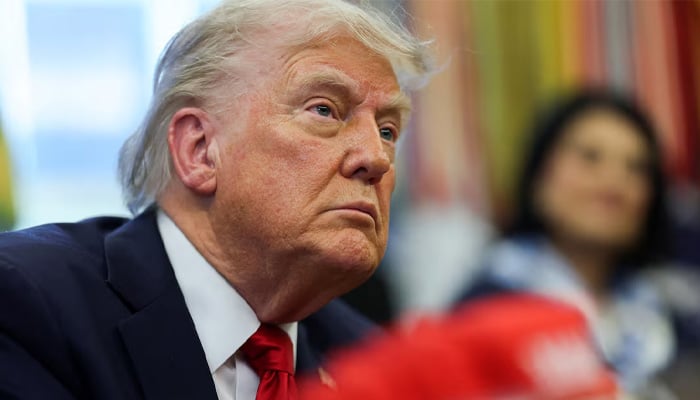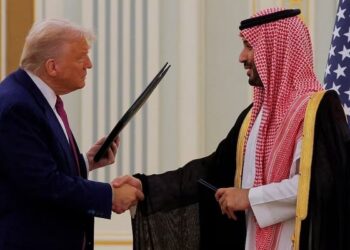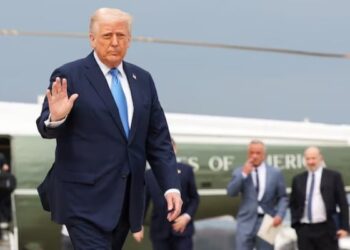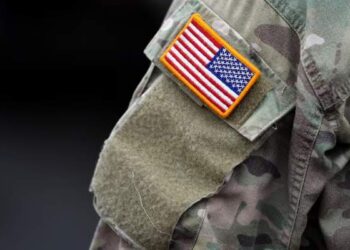- Trump plans to unveil an arms deal during his upcoming visit to Saudi Arabia in May.
- Sources wish to remain anonymous due to the delicate nature of the information.
- Congress must evaluate significant international arms agreements before they are finalized.
The United States is preparing to present Saudi Arabia with an arms package exceeding $100 billion, according to six sources familiar with the discussions who spoke to Reuters. This announcement is expected during US President Donald Trump’s visit to the nation next month.
This proposed package follows the attempts made by former President Joe Biden’s administration to finalize a defense agreement with Riyadh amidst plans for Saudi Arabia to establish relations with Israel.
The Biden proposal aimed to provide access to advanced US weaponry in exchange for limiting Saudi purchases of arms from China and restricting Chinese investments in the country. Reuters was unable to determine whether Trump’s administration includes similar stipulations in its proposal.
Both the White House and Saudi officials did not immediately respond to inquiries seeking comment.
A US Defense official stated, “Our defense collaboration with Saudi Arabia is stronger than ever under President Trump’s leadership. It is vital that we continue our security partnership and address their defense requirements.”
During his first term, Trump touted arms sales to Saudi Arabia as beneficial for American jobs.
Lockheed Martin Corp is anticipated to provide several advanced weapon systems, including C-130 transport aircraft, according to two of the sources. One insider indicated that Lockheed would also be supplying missiles and radar systems.
RTX Corp, formerly Raytheon Technologies, is also expected to be a key player in this arms package, which is likely to involve supplies from other major American defense contractors like Boeing Co, Northrop Grumman Corp, and General Atomics, as indicated by four of the sources.
All sources declined to disclose their identities because of the sensitive nature of this issue.
RTX, Northrop, and General Atomics did not provide comments, while Boeing has not yet responded to requests for input. A spokesperson for Lockheed Martin noted that foreign military sales are government-to-government transactions and that questions regarding sales to foreign governments should be directed to the US government.
Reuters could not immediately verify how many of the proposed deals are new, although two sources suggested that many have been in development for quite some time. For instance, the Kingdom first inquired about General Atomics drones back in 2018. Over the past year, a $20 billion deal for General Atomics’ MQ-9B SeaGuardian drones and other aircraft has gained traction, a source revealed.
Multiple executives from defense firms are considering joining the delegation to the region, according to three of the sources.
The US has a long history of supplying arms to Saudi Arabia. In 2017, Trump proposed around $110 billion in sales to the Kingdom.
As of 2018, only $14.5 billion of those sales had taken place, leading Congress to scrutinize the agreements further. Under Biden’s administration, Congress imposed restrictions on the sale of offensive weapons to Saudi Arabia in 2021.
According to US law, major international arms deals must undergo Congressional review before they can be finalized.
The Biden administration began to ease its stance toward Saudi Arabia in 2022, in response to the global oil supply disruptions following Russia’s invasion of Ukraine. The ban on offensive weapons sales was lifted in 2024 as Washington increased its collaboration with Riyadh after the attack on October 7.
Possible discussions regarding a deal for Lockheed’s F-35 jets, which Saudi Arabia has expressed interest in for years, are expected, although three sources indicate that a contract is unlikely to be finalized during the trip.
The United States ensures that its close ally Israel receives advanced American weaponry, maintaining what is termed a “Qualitative Military Edge” (QME) over neighboring Arab states.
Israel has been operating F-35 aircraft for nine years, having established multiple squadrons.





